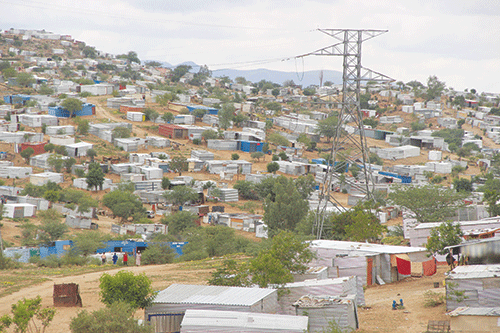The City of Windhoek is adamant it will bring about an end to deplorable makeshift zinc structures, known as shacks, in informal settlements through an affordable housing project.
“The affordable housing project in Havana Proper continues until all houses in the area are converted from zinc to brick houses. The project will be extended to Havana Extension One soon, pending the finalisation of the planning and layout,” the City shared this week after conducting
a consultative meeting with residents of Moses /Garoëb constituency
during the weekend.
Last year, the Popular Democratic Movement (PDM) president
McHenry Venaani tabled a motion in the National Assembly to debate alternative housing financing
schemes. At that stage, he described the current housing situation as distressing, intolerable and shocking.
In his motivation, Venaani noted there are 285 informal settlements in towns across Namibia, meaning 40% of urban inhabitants or 216 000 urban households are informally settled.
This state of affairs is indicative of the high urbanisation rates across the country.
Now, the Windhoek Municipal Council’s Affordable Housing programme aims to
turn around the horrendous housing situation.
This programme focuses on constructing houses for low to middle-income residents at more affordable prices, ranging from
N$300 000 to N$650 000, excluding
land.
Namibia’s escalating housing backlog is mostly due to the unaffordability of houses, exacerbated by a discrepancy in the demand and supply of decent housing.
While government has attempted to rectify the slow pace of delivering serviced land and affordable housing, such as
through the N$45 billion Mass Housing Project a decade ago, the implementation
and execution of this and similar
programmes has done little to alleviate the plight of the houseless in the country.
According to the FNB Namibia
residential property report, by the end of March 2022, the average house in Namibia cost N$1.2 million.
Furthermore, the World Bank stated
that Namibia’s urban population is
expected to increase from 52% to 60% by 2030.
The global financial institution stated
that Namibia needs more than 30 000 housing units annually to fight the
escalating housing backlog.
To clear the backlog of 300 000 houses over the next 10 years, more than 30 000 housing units are required per annum.
One of the solutions proposed is effective public private partnerships that can help rebuild the local construction sector’s capacity and stimulate linkages with the domestic manufacturing sector. –mndjavera@nepc.com.na



